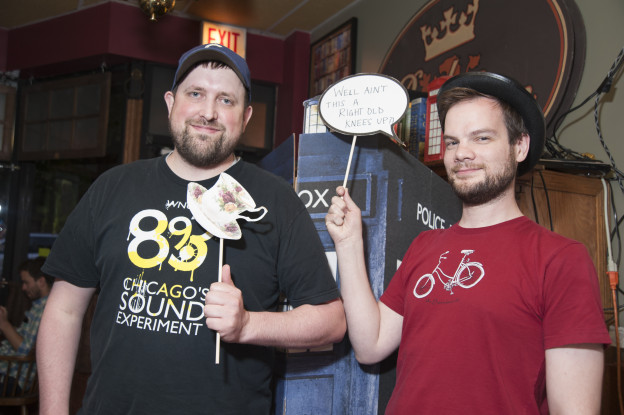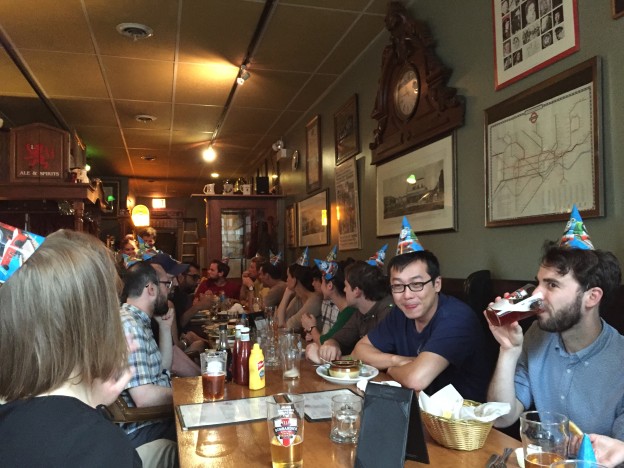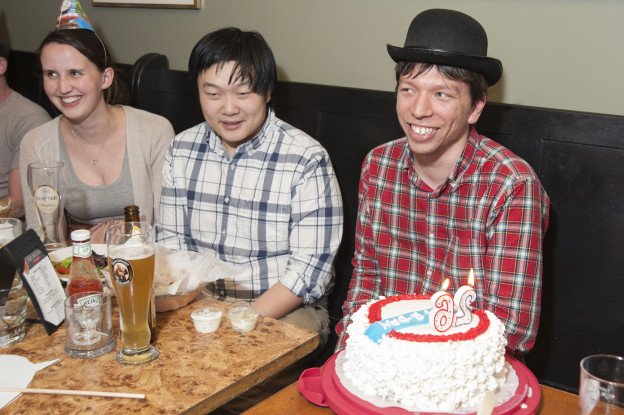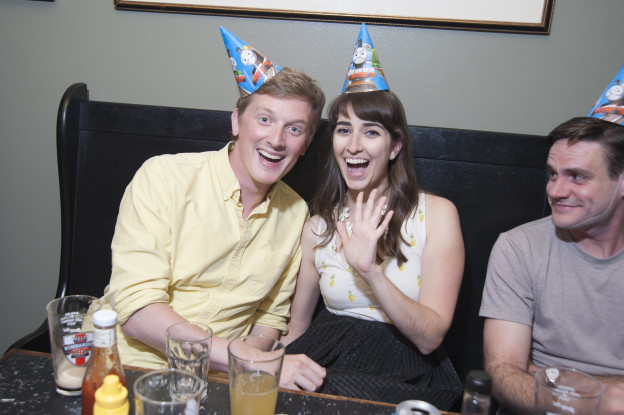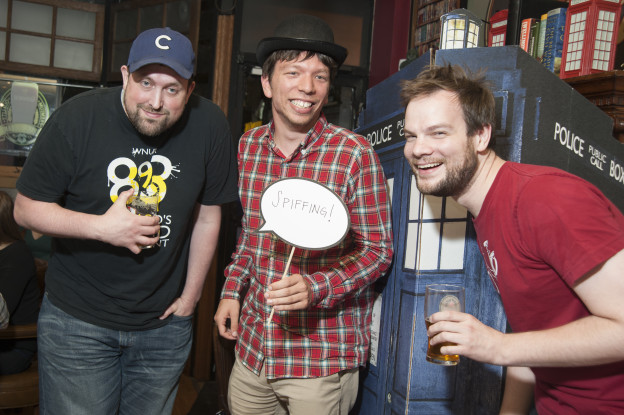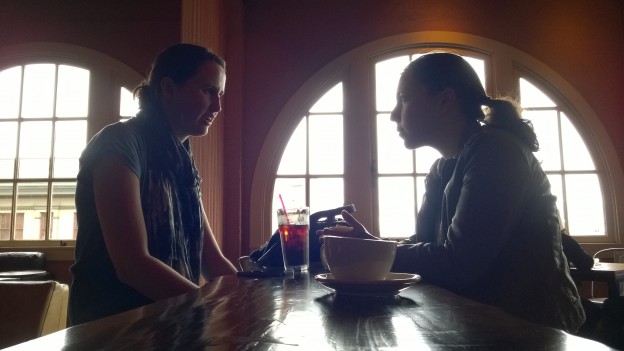I think I’ve had more than my fair share in life, but I still love surprise birthdy parties 🙂
Thank you so much to everyone who came: Billy, Taylor, Agata, Emilie, Ellen, Robert, Julie, Shelby, Benno, Calvin, Nolan, Chrissy, Brandon, Carolyn, Theron, Catherine, Jason, Ramya, Abhishek, Karol, Kevin, Corey and ESPECIALLY to:
- Todd, who organised a British-themed trivia quiz (which my team thankfully won else I’d never hear the end of it)
- Katie, who baked cakes and took photos and decorated and is generally awesome
- Randi, who masterminded the whole thing and is (a) untrustworthy (b) amazing ❤
And also to my sisters who contributed British phrases in advance! (Did you know that “lost the plot” is not part of American English? That’s a real loss.) I love all of the above.
Turning 26 means I’ve been living in Chicago for a little over a year, and I am still blown away by the warmth and generosity of the people in my life here. It’s sad that immigration is never seen in these terms back at home. Instead it’s all migration statistics, spurious debates about welfare and tough talk about border controls. If we spent a fraction of the time celebrating instead what it takes to make people feel welcome, we’d be a happier people.
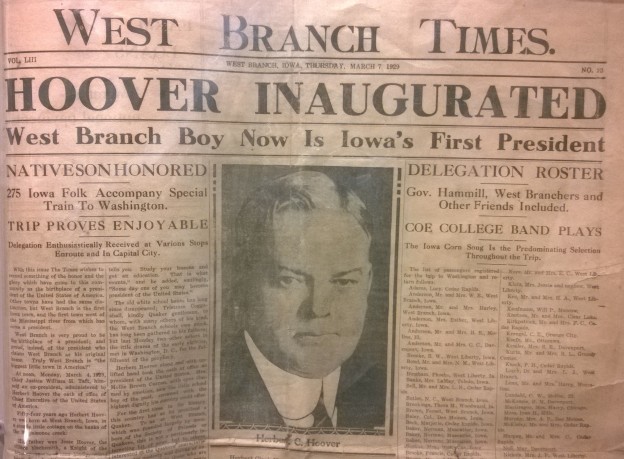
They were excited in West Branch, Iowa when native son Herbert Hoover became President. It didn’t last.
No one seemed very excited about our trip to Iowa. “Why are you going to Iowa?” asked most. So I’m pleased to announce the following discovery: Iowa is lovely. Quiet, rural, unassuming – I am assuming this will be a once-in-a-lifetime visit – but still lovely. And as Reddit correctly predicted, the people we met were all delightful, which puts Iowans way ahead of fancy-pants Seattleites.
If you’ve heard anything at all about Iowa, it’s probably because it always snags first spot in the voting schedule for the Presidential primary elections, briefly catapulting the state onto global news bulletins for a few days every four years. With candidates already swarming to patronise woo the electorate, we were hoping to bump into something political, and as luck would have it our first night’s B&B just happened to be run by enthusiastic Hillary Clinton supporters. So naturally we stuck around the next morning to watch her ‘launch’ speech and pose with banners:

Hillary for Iowa! Also, for the other 49 states too!
Later on, in unimaginatively-named Iowa City, we dined in Hamburg Inn No. 2 – which it seems is mandatory for any sort of political career in the US – and, in West Branch, we checked out the Herbert Hoover Presidential Library & Museum. Hoover is best remembered for being in office during the Wall Street crash of 1929 and the onset of the Great Depression, and the museum’s main strategy for tackling this unfortunate fact is to focus about 80% of the exhibit on his pre-presidential humanitarian efforts.
Hoover’s ‘good guy’ credentials thus burnished, they offer an increasingly desperate series of excuses for Hoover’s failure, culminating in “who’s to say it wouldn’t have been worse without him?”, and then a series of buttons to canvas your opinion on Hoover from ‘Strongly Positive’ (hah!) to ‘Strongly Negative’. I gave him one level up from the bottom. Hell, I can think of worse Presidents…
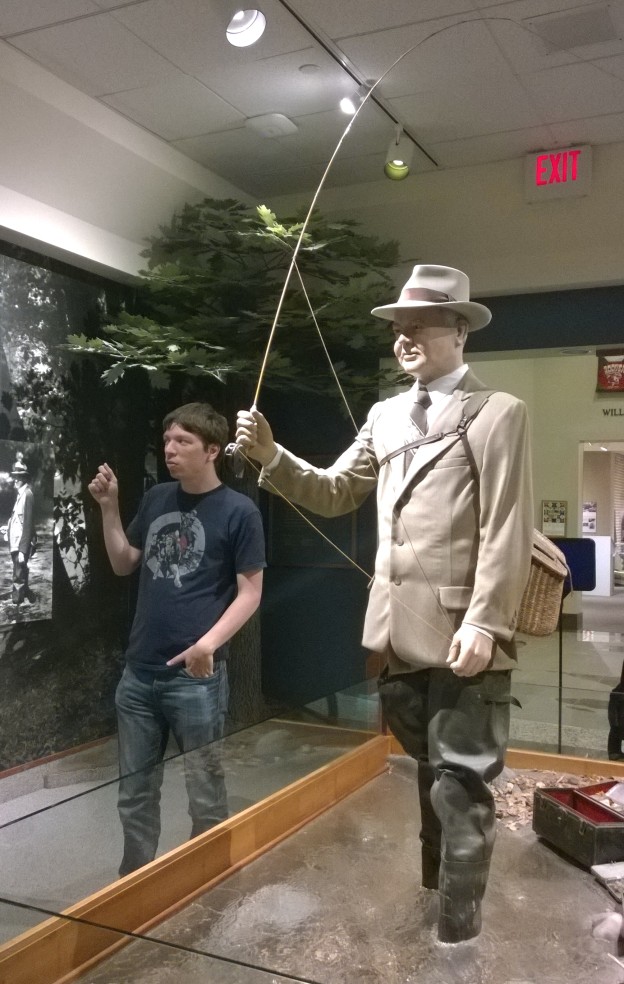
They wouldn’t let me get as close to Hoover as LBJ, but we still enjoyed some quality fishing time together
On Sunday, the weather brightened up and we stopped at Lake Macbride State Park for a spot of swimming and kayaking, which always reminds me of our Wednesday afternoon Sixth Form kayaking lessons down at the Ladbroke Gove canal. Anyway. Kayaking is fun!

Left, right, left, right, stop to pose
Also in Iowa:
- A sign at ‘Family Video’ by the highway promises Report Card A’s Equals Free Rentals!
- It’s not always easy to find vegetarian options on menus.
- But it is easy to find great ice cream at Whitey’s (thanks, Nolan).
- The city of Davenport has built itself a seemingly pointless but enchanting Skybridge.
- Roads are empowered to suddenly declare that ‘pavement ends’ and leave you stranded on miles of unpaved track. We didn’t stay on it long enough to discover what the ‘minimum maintenance’ section would be like.

A fair bit of Iowa was like this
And in Kalona (population: 2,363) the large proportion of Mennonites gave the place a distinctive feel:

You know what I like about horses? They don’t turn on red.
“Not This Frog”
As I say, everyone was super-Mid-Western-friendly. We so enjoyed talking to Daisy, the owner of Iowa City’s A Bella Vista, that we risked the late return of our rental car to stay and chat longer. But the final word should go to owners of Strawberry Farm Bed & Breakfast after we finally turned up at 11pm. Despite the late hour they launched into a discussion of their dog, their neighbours and – most importantly – the frog which was currently perched on their front door.
“Do you know what this is?” the guy asked, but my hopes of being the unexpectedly knowledgeable city boy (“it’s a frog!”) were soon dashed as he began to list possible species. “It reminds me of having dinner under the skylight when we were growing up”, his wife added, “and we’d look up and see this frog. Not this frog.”
Perhaps we were just tired, but it felt like a moment.

IOWA, YEAH

The 606 (with guests)
A smorgasbord of things to post about:
- Improv comedy featuring fellow megachurch attendee Kannan in Fucked Up Family Reunion. Sadly my family isn’t nearly interesting enough to qualify, but another audience member stepped up to the plate to provide material.
- Take the Armenian genocide, mix with a dysfunctional marriage and you get Beast on the Moon – an unsurprisingly intense play about two survivors living in 1920s Milwaukee. Bonus theatre points: the playwright turned out to be sitting behind us.
- Hayao Miyazaki’s swansong, The Wind Rises, was first released in 2013 but Katie tipped me off to a showing and I was delighted to catch it in the cinema. Like his other films that I’ve seen, My Neighbour Totoro and Spirited Away, the imagination and wandering narrative is quite different to most Hollywood films, and the film’s thoughtful and nuanced approach to Japanese engineering during WW2 is probably evidence that ‘losing’ countries make better art. Plus the short, angry boss character is quite wonderful.
- After another term of SPARK mentoring, I attended another ‘Discovery Night’ where students in the programme present their projects to classmates and parents. Huge thanks to Katie for stepping in midway through to mentor!
- At Simon’s suggestion, Randi and I caught the Chicago leg of Scott Bradlee’s Postmodern Jukebox tour – vintage covers of Taylor Swift, One Direction, Magic! and more. It was a lot of fun, even from the nosebleeds.
- We also saw Ex Machina (along with Kevin and Nolan) which was creepy, wonderful, and left me deeply disturbed and distrusting of everyone around me in case they were actually vengeful robots with AI.
- And finally, today was 06/06/2015 – or, in American dating formatting, 06/06/2015. Which was nice, because (a) it doesn’t make my new t-shirt look stupid, and (b) it was also the opening day of Chicago’s new elevated ‘Bloomingdale Trail’ or ‘The 606‘. Basically, it’s like New York’s High Line, but in Chicago, and about double the length at 3 miles (so there). Opening day was fortuitously sunny and pulled in large, good-natured crowds with some very reasonably priced beer, live music and some free memorabilia. Looking to take a Chicago visitor on a good stroll? It’s been a long time coming, but the 606 has finally arrived, and it’s a pretty great addition to the city below.

At the 606 launch with Randi, Katie and Brandon
I’m back from the Pacific Northwest – a little worse for wear (unattractive sneezing and coughing abounds) but with a satisfied feeling of successful travel and the smug afterglow of being moved into United’s ‘Economy Plus’ seats on the way home.
So, Seattle first. The home of Starbucks and Amazon, as well as the famous Pike Place Market, one unexpected thing which we noticed immediately was that its inhabitants can be a little… blunt, let’s say. I grew up in London, and no-one there ever hung up my call on the apartment entryphone in order to let themselves in first.
Not that this stopped us from enjoying the city, and we packed in the obvious tourist destinations: dinner in the Space Needle, taking the ferry to Bainbridge island, touring the EMP Museum (see Dalek, below) and the Central Library. Together with newly-minted Seattle resident (and not at all rude) Michele, I also checked out the Northwest Folklife festival which happened to be on: think handmade “SAVE THE BEES” t-shirts on Greenpeace activists, fun music and a strong smell of pot. (Less predictably, you can also buy jewellery there which is made from ammunition. It takes all sorts.)
For the second half, we caught an early Amtrak train down to Portland. (I miss trains.) Portland had an unexpectedly spread-out feel, but still with plenty of parks, green spaces and easy walking. “OUR FEMINISM WILL BE INTERSECTIONAL”, announced large letters in one window we passed, “OR IT WILL BE BULLSHIT”. We found fewer obvious landmarks to photograph, but kept eating delicious food: a particular shout-out to Salt & Straw, whose rhubarb crumble ice-cream is something special.
Some people have described the Northwest as their favourite corner of America. It’s not mine, but I can see why it might be. Both cities are certainly well worth a visit!

Campaign Finance Reform! In game form!
For Randi’s birthday on Sunday, I thought it would be fun to make a video game. (That might sound crazy, but she thought it would be fun to run a half-marathon: at least my craziness can be done sitting down.) To do this I chose Construct 2, a lovely bit of software from London-based start-up Scirra. It took a couple of weeks to get the whole thing done, but the learning curve is gentle and the basics quickly understood. If you’ve ever had the itch to make a game yourself, this is an easy yet flexible way of doing so.
I still get tingles from the power of the tools available to us today. It’s something I see with the kids I mentor with, too – with a little effort, it’s remarkably easy to quickly pull together a project which would have required feats of organisation and specialist equipment in the past. I can just about remember doing a primary school assignment on Greece, say, with an out-of-date edition of Encyclopaedia Britannica, a Compton’s CD-ROM and possibly a colour printer if it wasn’t out of ink.
This makes me sound so old, I know.
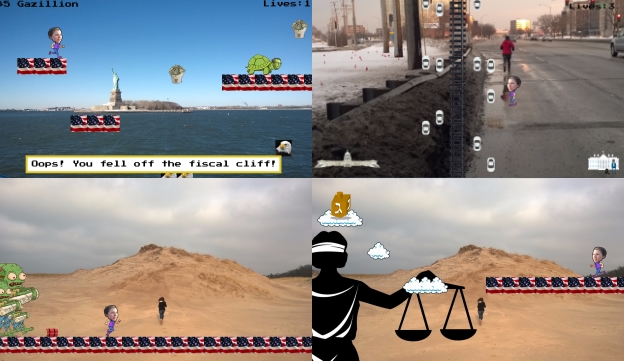
Collect cash, beat turtles, avoid cars, kill zombies and more
Tomorrow night we embark on a long Memorial Day weekend to the West Coast, knocking out two more states from my travel list. I can’t promise to get to 50, but I can try 😀

